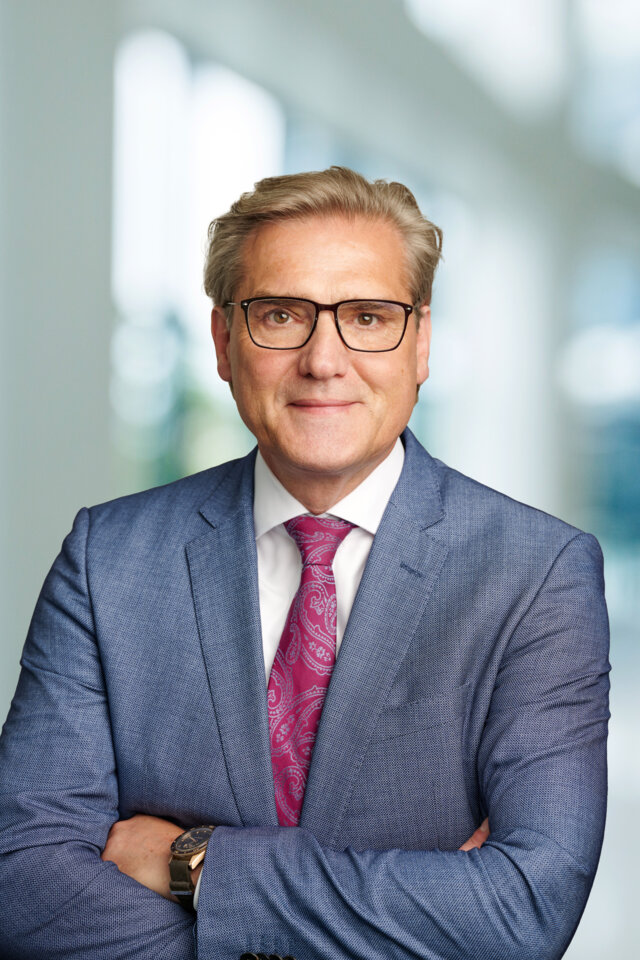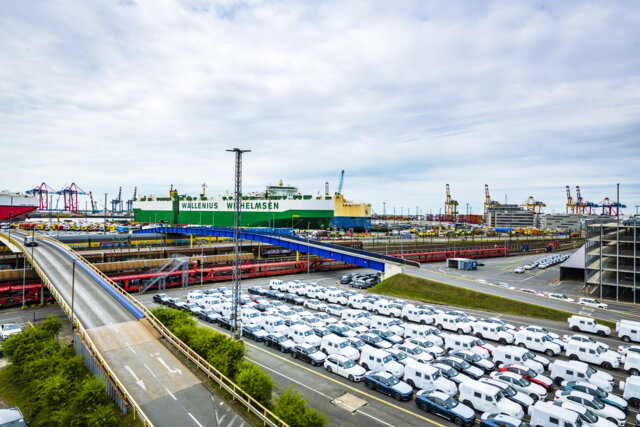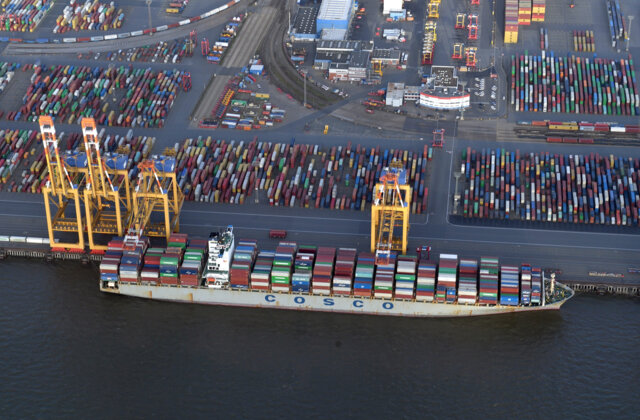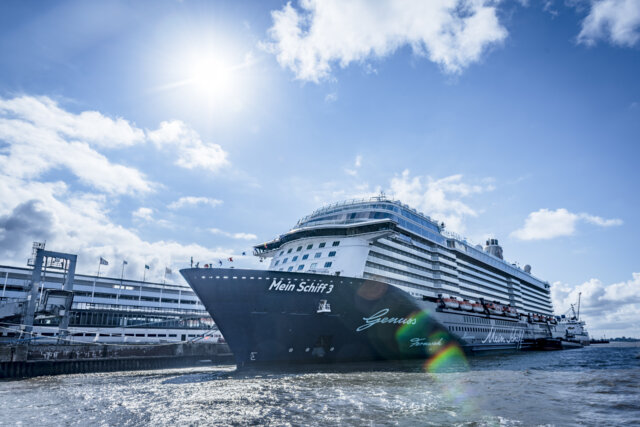01 June 2023
This month, we are heading towards Bremen, since bremenports is our host for the 2023 ESPO Conference. This is the perfect opportunity for an interview with Mr. Robert Howe, Managing Director of bremenports in Germany. Read on to discover the interesting topics addressed by our port pro of the month.

Can you briefly tell us about bremenports? What are its key features and what challenges is it currently facing?
Yes, gladly. Bremenports GmbH & Co.KG is a public enterprise which is responsible for management of the port facilities in Bremen and Bremerhaven. The company has a staff of 400 and its head office is in Bremerhaven. On behalf of Bremen’s Senate, we take care of port development, maintenance of the port facilities, numerous new-build projects, the terminal railway, real estate, finances as well as flood protection. In other words, our remit covers maintenance and upgrade of the existing port infrastructure and ensuring the future development of our ports as a whole. What’s more, we also pursue passionate and sustainable location marketing to showcase the ports of Bremen.
What is your long-term vision for bremenports? What are the main investment projects for the next few years? Can you briefly describe the importance of these investment projects for the port and the city?
Right at the top of the agenda is the task of raising the profile of the ports as a climate-neutral innovator while simultaneously continuing to improve their competitiveness. Let me give you one example: It is a well-known fact that with a total length of five kilometres, our container quay is the longest in Europe. But some parts of it are already fifty years old and some sections can no longer cope with today’s requirements. We are therefore planning to rebuild the quay in various stages over the next decade. The terminal operators will renew the superstructure, i.e. the cranes, gantries and railway facilities. We are also planning to deepen the access to the terminal in response to the increasing draughts of container vessels. We are convinced that this is the right way to make Bremerhaven the most attractive deep-water port on the North Sea coast. We will also achieve climate neutrality at the container terminal by that time. That is our innovative package for the port of the future.

"Ports as partners in the race towards a net-zero future” is the theme of the 2023 ESPO Conference 2023. What do you believe is bremenports’ role when it comes to achieving a net-zero future? Can you outline the main elements of your strategy? What opportunities do you see in this changing landscape? Are you preparing for the arrival of the hydrogen economy?
This is a topic that covers highly diverse aspects: first of all, net-zero future means fully decarbonising our ports. In that respect, we have an excellent starting position because we have already done the preparatory theoretical work as part of a major national research project. Together with the business community at the port, we are now in the process of defining and implementing specific projects. We intend to develop our own SMART grid for the Überseehafen district, which will operate solely with renewable energy. This is an enormous challenge, as we will in future need huge additional quantities of power for shore power operations.
We also believe that net-zero future means a new challenge for the ports in society as a whole. In order to decarbonise Germany as an industrial nation, we will also have to import vast quantities of energy in future. However, this will not be gas from Russia, but hydrogen produced from renewable sources.
Can Bremen be a partner in the energy transition?
Yes. Bremen has excellent conditions, which rank among the best for the entire North Sea. We are planning the development of an EnergyPort in Bremerhaven on a huge site that can accommodate ocean-going vessels. The government has already adopted the necessary legislation and has commissioned bremenports with the project planning. This refers to the import of green hydrogen which will arrive at the new terminal where it is fed into the long-distance grid. It also involves the shipment of giant offshore wind installations for the programme to promote offshore energy which has been launched by the federal government. It also involves the transport of unavoidable carbon via the ports to suitable final disposal sites. And it also covers many other aspects of the green-tech economy. I am convinced that a terminal for a net-zero future will go into operation in Bremerhaven before the end of this decade.

In the last few years, the ports have played a key role in helping Europe overcome various crises. How did bremenports experience these crises? What was your contribution to ensuring the continuity of supply chains and energy security?
I do not succumb to the illusion that the crises are over. If you ask me, we are still right in the midst of them, even if the health crisis appears to be over for the time being. But the crisis taught us one thing which certainly does not apply only in Bremen: the greater the challenge, the more important it is for the different actors to join forces. While that applies to cooperation within the company, it is even more important for all the actors involved in the microcosm that is the port. I can safely say that at our ports, we have become even closer as a result of the crises.
Good hinterland connections are essential for the ports to transport goods to their ultimate destinations. Could you briefly state how bremenports is linked to the hinterland?
We have excellent connections. Hamburg and Bremen are known as the leading European players in terms of rail transport to the hinterland. We transport every second container on rail; for automotive and high and heavy products, rail accounts for a share of more than eighty per cent. That is a world record. Moreover, we are constantly endeavouring to make our terminal railway even more effective and efficient. However, the motorway connections to Bremen and Bremerhaven are also very good and will become even better. What I would like to see in the future is better exploitation of the potential of inland shipping through Bremen. Hinterland transport can help to achieve net-zero future in a number of different ways. The ports in Europe can make a significant contribution by decarbonising supply chains.
The automotive business is of crucial importance for the ports of Bremen. How is this sector developing? What are the greatest challenges that currently confront the ports?
The transition to electro-mobility will undoubtedly mean radical changes for this segment. To begin with, this will affect the German automobile manufacturers and will certainly also impact the ports. If there is a shift in the balance between import and export, this will also change the work packages at the ports. It is not yet possible to make a definitive assessment of the opportunities and risks for the future. As far as infrastructure is concerned, our port facilities are well prepared to cope with all scenarios, as we have numerous ro-ro berths behind the locks in Bremerhaven.

You won the ESPO Award for social integration in 2016 with the focus on “Nature in Ports”. A proposal for legislation to restore nature is currently under discussion in Europe. How does bremenports work in line with nature?
We are responsible for the largest nature reserve in the Federal Land of Bremen. This is something we have developed over the past fifteen years to compensate for the loss of nature caused by construction projects at the ports. Our policy is that port construction must also benefit nature. We are proud to have created an impressive example of that policy at Luneplate, which is now a designated European Important Bird Area.
The cruise shipping business has enjoyed a major upswing in Bremerhaven. How do you think this sector will develop over the coming years? What are the greatest challenges?
Bremerhaven has evolved from a niche player into a focal point for this sector. We are doing all we can to promote this development. We are building a new quay for the large cruise liners. We are building extensions to make the already good terminal even better and, in the future, we shall of course offer shore power to help accelerate the decarbonisation of this business sector.
Recently, bremenports successfully renewed its PERS certification in the EcoPorts network. What does this mean in terms of greening your port? Do you have a strategy? What measures is the port taking to implement that strategy?
We have a systematic energy management policy and have reduced our energy consumption by seventy per cent over the last ten years. Bremenports has already been a climate-neutral business enterprise for years. We are in the process of renewing our fleet of dredgers and equipping the vessels with alternative propulsion systems. Thanks to the systematic management of dredging spoils, we have helped to ensure that uncontaminated silt is now a commodity which can become part of the circular economy. This dredging spoils management concept is another positive feature of the ports of Bremen. We have excellent disposal structures in place for our port maintenance which have proved successful in practice.
Together with the Senator for Science and Ports, bremenports is hosting the 2023 ESPO Conference. This gives you an opportunity to showcase your ports on a European platform. What is the main message you wish to communicate when organising this top-ranking port conference?
Intensive knowledge sharing and close cooperation are more important than ever in view of the enormous challenges facing us in this day and age. We want to make it clear that we advocate for a strong European economy and an ambitious ecological approach. However, this is not something the ports can achieve on their own; on the contrary, this calls for clear and uniform regulatory standards and intelligent funding programmes at European level. It is important that ESPO communicates this central message to the policy-makers. The ports are and will in the future remain the key transhipment location in global supply chains and are of central importance to Europe.
How did you come to the port management business? How did your previous career lead you to this position?
I have had strong ties with the sea, shipping and the port since the day I was born. I grew up beside the North Sea dike. My training as an engineer and the many river and coastal engineering projects I worked on in Germany and abroad over twenty years in the building industry ultimately brought me back to the ports of Bremen as Technical Director. I have meanwhile been in charge of bremenports as CEO for six years and I cannot imagine anything better.

Related documents
No attachments.
